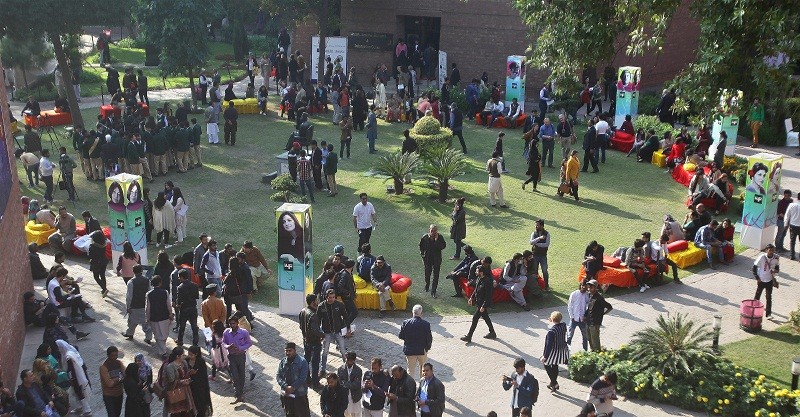
Lahore Literary Festival returned for its seventh edition last week, bringing together today’s leading writers, thinkers and cultural observers

The 7th Annual Lahore Literary Festival (LLF) took place last week from February 22 to 24, boasting a dazzling lineup of academics, writers and public figures from Pakistan as well as around the world. Over the course of 75 sessions scheduled over three days at Alhamra Arts Complex, topics as diverse as Water Insecurity in Pakistan, the life of Qandeel Baloch, Literature and Sufism in Khyber-Pakhtunkhwa, and the experience of war and writing about it in Syria and the Middle-East were discussed, just to name a few.
Entering into the Alhamra from the street, one of my favourite sights was of school children dressed up as ushers in their LLF merchandise: T-shirts emblazoned with the logo, brightly coloured name-tags strung around their necks, and an eager-to-be-of-assistance attitude that made most visitors feel immediately at home. Taking a few steps further towards the central courtyard, visitors were received by a tangerine marigold adorned reception/help desk and traditional takht seating draped with brightly coloured silks fluttering in the sunshine. Atop the stairs leading into the event space’s art gallery, a flute, tabla and harmonium were played by musicians providing the perfect backdrop to what promised to be a lovely afternoon.
For many patrons of the festival, it is a unique opportunity for the ‘intellectual elite’ to congregate in one place and celebrate the latest literary achievements, debate the most recent political fiasco, and admire both progressive and never-before-seen historical art all under the auspicious roof of the Alhamra on the historic Mall Road of Lahore.
LLF "aims to reclaim Lahore’s cultural significance and influence" as per their website. Its mission statement is to explore the dialogue and interface between literature and the arts, but all this is not to say that the Lahore Literary Festival is not without its pitfalls. Unfortunately, it has been marred by scandal in the past. In early 2018, the case of a young girl named Zainab who had gone missing and was subsequently found abused and brutally murdered was captivating the public. Around the same time, one of the founders of the festival aired some unsavoury opinions on social media about child abuse. Subsequently, after much hue and cry on social media about the tweets by members of the public, the board of LLF issued a statement distancing themselves from the said board member. The damage, unfortunately, had already been done and the series of tweets evoked many reactions, the most prominent of which was a call for boycotting the event in 2018 because of its connection with the offender.
This time around more than a year had passed since, and there seemed to be no overt call for a boycott from the keyboard warriors of the internet. Nevertheless, the hype surrounding the event seemed to have taken on an unusual damper, with no outright advertising or talk around town about the upcoming festival in the days leading up to it. This could simply be put down to fickle attention spans of the Lahori who’s who, no longer eager to partake in the festival’s academic programming as the novelty has worn off.
Nevertheless, the festival boasted an impressive collection of sponsors, which is definitely one of the things the LLF is adept at. For several years, Pakistani diasporic writers who are otherwise relatively unknown in the Pakistan literary scene have gotten the chance to come ‘home’, such as writer Roopa Farooki who delivered a talk on Lahore as ‘A City in Fiction’ along with Osama Siddique and Muneeza Shamsie on Day 2, and also American- Pakistani writer Soniah Kamal who launched her book Unmarriagable: Pride and Prejudice in Pakistan on Day 3.
Whether it is the influence of sponsors or an attempt to draw larger crowds into the audience, much of the LLF’s programming over the last few years has included talks by individuals from many different areas of interest. Political activist Fatima Bhutto discussed radicalisation and Muslim identity on a panel this year, television personalities Iqra Aziz and Atiqa Odho analysed the reasons for why women are only portrayed either as damsels in distress or evil and conniving in Urdu drama serials, food writers such as Kamin Mohammadi and cookbook author Anissa Helou participated in a panel with Zahra Khan who owns the Cosa Nostra chain of restaurants.
Such diverse programming and broad scope of discussion ensures that the literature festival is not limiting itself to individuals with an interest only in literature, and ensures longevity to the LLF name. In the panel entitled, ‘A Woman Like Her’, organisers thoughtfully arranged for Sanam Maher, author of the book The Sensational Life and Death of Qandeel Baloch, Sindhi poet and activist Amar Sindhu, and the first female Divisional Police Officer in Pakistan, Ammar Athar, to discuss honour killings and female oppression in Pakistan together on the same stage. In this way, each talk was organised so that it satisfied several different avenues of interest.
Also read: Manto in depth
In the foyer of Hall 2, a brilliant sound installation organised by Ateeq Ahmed encapsulating the diverse notes and tones of the bustling city of Lahore captured the imagination of several passers-by.
Opportunities to gather and celebrate the liberal arts, free of charge and completely open to the public are a rare opportunity. This is the Lahore anyone could fall in love with, and for that, we should thank the Lahore Literary Festival.